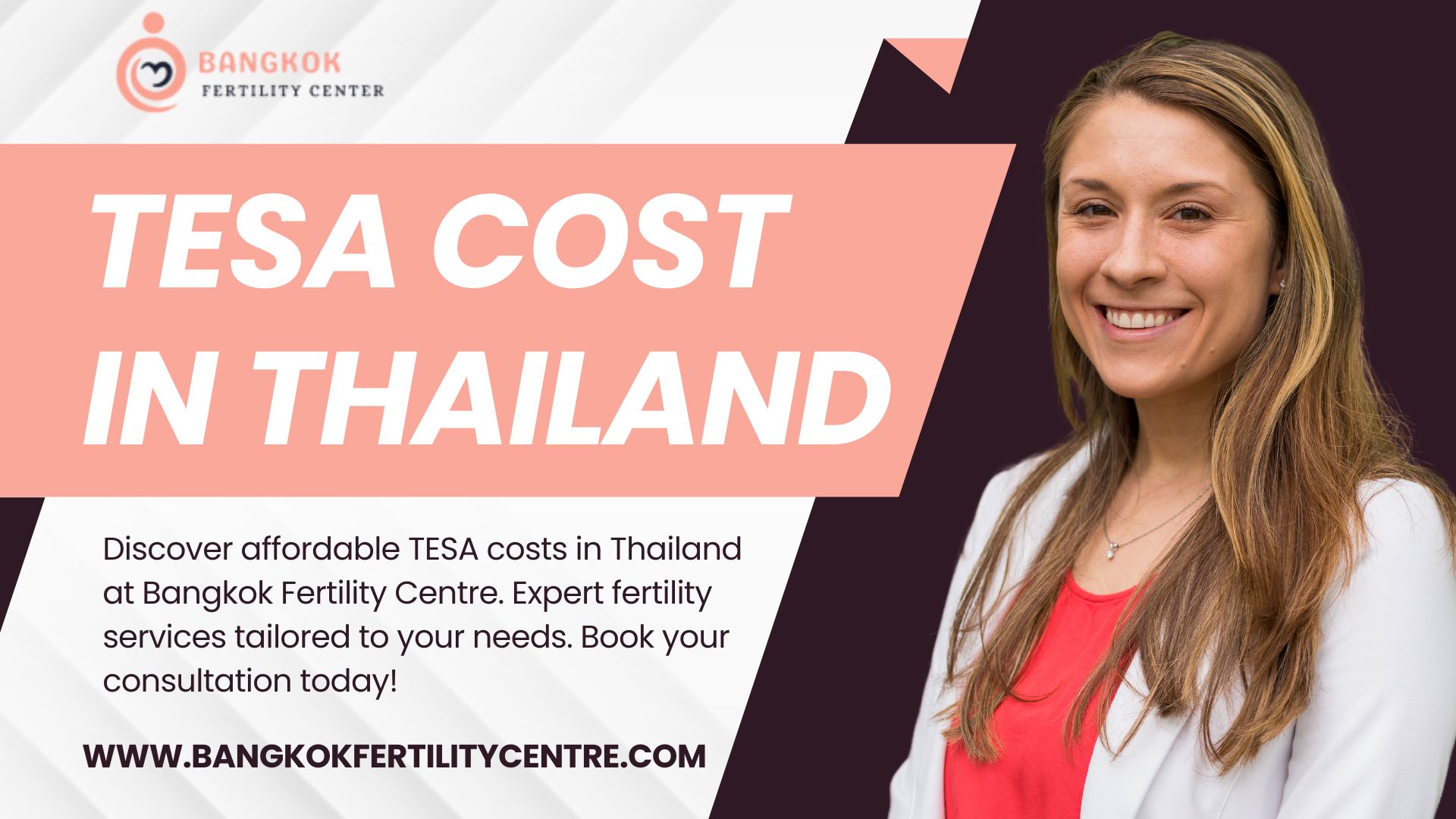Subtotal $0.00
Looking to undergo Testicular Sperm Aspiration (TESA) and curious about the costs in Thailand? Look no further than Bangkok Fertility Centre, renowned for its expertise in fertility treatments. TESA Cost in Thailand at Bangkok Fertility Centre offers a cost-effective solution for individuals seeking this specialized procedure. With state-of-the-art facilities and experienced clinical experts, the middle gives customized care and far reaching support all through the TESA process. Find reasonable yet excellent fertility treatments at Bangkok Fertility Centre, guaranteeing trust and potential outcomes on your excursion towards life as a parent.

Understanding TESA Treatment
Male infertility can be a distressing and emotionally challenging issue for couples attempting to consider. Luckily, headways in clinical science have given different fruitfulness medicines to address male barrenness. One such methodology that has acquired noticeable quality is Testicular Sperm Desire (TESA). This part dives into the principal parts of TESA treatment, shedding light on its significance, applications, and success rates.
What is TESA (Testicular Sperm Aspiration)?
TESA, or Testicular Sperm Aspiration, is a negligibly intrusive surgery used to recover sperm straightforwardly from the balls of men who experience issues creating sperm normally. It is a type of sperm recovery procedure and is commonly suggested for people with obstructive azoospermia or non-obstructive azoospermia.
The Role of TESA in Male Infertility Diagnosis and Treatment
TESA plays a crucial role in the diagnosis and treatment of male infertility, specifically in cases where sperm production or release is impaired. It allows urologists or anthologists to directly access the testicular tissue to obtain viable sperm for assisted reproductive techniques, such as Intra-Cytoplasmic Sperm Injection (ICSI) during in vitro fertilization (IVF) or Intracytoplasmic Morphologically Selected Sperm Injection (IMSI). TESA is particularly beneficial for men with obstructive azoospermia, where there is a blockage in the reproductive tract preventing the release of sperm, or non-obstructive azoospermia, where the testicles do not produce sperm adequately.
Conditions That May Require TESA Procedures
TESA is typically recommended for men with the following conditions:
- Obstructive Azoospermia: In this condition, sperm is produced in the testicles but cannot be ejaculated due to a blockage in the reproductive tract, caused by previous surgeries, congenital abnormalities, or infections.
- Non-Obstructive Azoospermia: Non-obstructive azoospermia is characterized by low or absent sperm production in the testicles. TESA may be utilized to retrieve rare pockets of viable sperm for assisted reproductive techniques.
- Failed Previous Sperm Retrieval Attempts: In cases where other sperm retrieval techniques have failed, TESA may offer a viable alternative.
TESA vs. Other Sperm Retrieval Techniques – A Comparative Overview
TESA is one of several sperm retrieval techniques available to address male infertility. Other common procedures include Percutaneous Epidydimal Sperm Aspiration (PESA), Testicular Sperm Extraction (TESE), and Microdissection TESE (micro-TESE). The choice of technique depends on the specific condition and individual characteristics of the patient.
Compared to other techniques, TESA is considered less invasive and can be performed under local anesthesia. Additionally, TESA may be more suitable for certain cases of obstructive azoospermia.
Step to Step Procedure of TESA Cost in Thailand
Testicular Sperm Aspiration (TESA) is a methodology used to recover sperm straightforwardly from the balls for couples going through ripeness medicines, especially when the male accomplice faces issues with sperm creation or discharge. TESA is regularly performed by an andrologist or a ripeness subject matter expert and includes the accompanying step-by-step procedure:
- Anesthesia Administration: The patient is normally managed neighborhood or general sedation to guarantee solace during the technique. The decision of sedation relies upon the patient’s inclination and the clinical group’s suggestion.
- Preparing the Scrotum: The andrologist cleans and sterilizes the scrotum and the surrounding area to minimize the risk of infection during the TESA procedure.
- Locating the Testicular Tissue: Using a fine needle or a specialized biopsy needle, the andrologist carefully locates and identifies the testicular tissue. This step is guided by palpation or imaging techniques such as ultrasound.
- Aspiration of Testicular Tissue: The andrologist inserts the needle into the testicle and aspirates a small amount of tissue along with sperm cells. The collected tissue is then placed in a sterile container for further examination and processing in the laboratory.
- Laboratory Processing: In the laboratory, the collected testicular tissue is processed to extract viable sperm cells. The andrologist or embryologist carefully examines the tissue under a microscope to identify and isolate the best-quality sperm for use in assisted reproductive techniques, such as Intracytoplasmic Sperm Injection (ICSI).
- ICSI or Other Assisted Reproductive Techniques: The sperm retrieved through TESA is typically used for ICSI, where a single sperm is injected directly into a mature egg to facilitate fertilization. ICSI is commonly used when the sperm count or motility is significantly low, making natural fertilization challenging.
- Embryo Transfer: Once fertilization occurs successfully, the resulting embryos are cultured and monitored in the laboratory for a few days. The healthiest embryos are then selected for transfer into the female partner’s uterus during the embryo transfer procedure.
It’s essential to note that TESA is a minimally invasive procedure, and patients may experience some discomfort or mild soreness in the scrotal area after the anesthesia wears off. Recovery time is generally short, and patients can resume regular activities within a day or two.
Overall, TESA is a valuable fertility treatment choice for couples confronting male barrenness issues. The bit by bit method of TESA includes cautious recovery of testicular tissue to get sperm cells for use in helped regenerative procedures. With the headways in fruitfulness medicines, TESA has offered trust and expanded possibilities of effective origination for many couples around the world.
Is TESA a successful procedure?
With a 100% sperm recovery, TESA (Testicular Sperm Aspiration) has been one of the number one treatments to overcome infertility.
Started with a 34% success rate, today TESA is giving a ray to hope to countless couples going to infertility out there.
TESA- A route towards complete family
(TESA treatment cost in Thailand 2024): We have always heard and believed that a child completes a family. But, due to infertility, thousands of unfortunate couples wish to complete their family aka, to experience the joy of parenthood.
According to statics 1 out of every 10 couples is trying to conceive a child. More over, 13-15% of married couples are facing infertility problems in Thailand.
These statics are enough to show the rate of infertility in Thailand.
But, thanks to advanced technology, we live in a world where we have a scientific solution for every problem, and so are for infertility.
TESA- A dernier cri to treat infertility
Testicular Sperm Aspiration, also known as Epidydimal Sperm Aspiration, is a methodology used to treat men with Azoospermia or infertility issues.
TESA is a treatment for men with nil motility of sperms. It’s a procedure performed through surgical biopsy where sperms are directly executed from the balls through a small needle.
TESA to evince to-
TESA is one positive step towards fruitful parenthood, and it is suggested to patients with three major conditions-
- Patients are suggested to have TESA if they have a blockage in the epididymis.
- Patients with blockage in the duct of testes
- Male with low or zero sperm motility
- Multiple drugs can be used to increase the quality of the sperm in the male, but in few cases having good sperm motility count is a hard nut to crack.
- That is the phase when TESA comes into the limelight.
Boons and Bane of TESA
Every coin has two sides. Likewise, TESA has both advantages and disadvantages. Along with the plus points, you can get the side effects as well.
Thus, it’s de rigueur to have a good grasp of knowledge about what you are footing your step into. Check out the positives and negatives of TESA mentioned below.
Advantages of TESA
It’s a relief from long-term infertility. Plus, you can have a chance to be the genetic father of your baby.
Dis-Advantages of TESA
Not all the laboratories are genuine, and you need to know the difference between bonfire or not.
TESA Cost In Thailand
TESA (Testicular Sperm Aspiration) cost in Thailand, specifically at Bangkok Fertility Centre, ranges from $1,500 to $3,000. This procedure is performed by experienced specialists using advanced techniques to retrieve sperm directly from the testicles, offering a cost-effective solution for male infertility issues. The center’s transparent pricing ensures high-quality care without financial strain.
Bangkok Fertility Centre: Treatment Cost Table
| Procedure | Cost (USD) |
|---|---|
| Hysteroscopy | $3,000 – $5,000 |
| In vitro fertilization (IVF) | $6,000 – $8,000 |
| Intrauterine insemination (IUI) | $500 – $1,000 |
| Ovulation induction | $200 – $500 |
| Intracytoplasmic sperm injection (ICSI) | $7,000 – $9,000 |
| Gamete intrafallopian transfer (GIFT) | $8,000 – $10,000 |
| Zygote intrafallopian transfer (ZIFT) | $8,500 – $11,000 |
| Preimplantation genetic testing (PGT) | $1,000 – $3,000 |
| Vasectomy Reversal | $3,000 – $6,000 |
| Egg Donation | $5,000 – $8,000 |
| Laser Assisted Hatching | $1,000 – $2,000 |
| Embryo Donation | $4,000 – $7,000 |
| Egg Freezing | $1,000 – $2,500 |
| PICSI | $1,500 – $3,000 |
| Sperm Freezing | $300 – $600 |
| IMSI Treatment | $1,500 – $3,000 |
| Infertility Specialist | $100 – $300 (per consultation) |
| Laparoscopy | $2,000 – $4,000 |
| Surrogacy | $50,000 – $100,000 (includes surrogate mother compensation) |
| Surrogate Mother | $30,000 – $50,000 (compensation) |
| Blastocyst embryo transfer | $1,500 – $3,000 |
| Frozen embryo transfer | $1,500 – $2,500 |
| Semen freezing | $300 – $600 |
| IVF 3 cycle with injection using a donor egg and self sperm | $20,000 – $25,000 |
| IVF 3 cycle with injection using donor egg and self sperm | $18,000 – $23,000 |
| IVF 3 cycle with injection using own egg and donor sperm | $17,000 – $22,000 |
| IUI without injection | $500 – $1,000 |
| IUI 2 cycle with injection | $1,000 – $2,000 |
| FET | $2,000 – $3,000 |
| Normal vaginal delivery cost | $2,000 – $4,000 |
| C-section delivery cost | $4,000 – $6,000 |
Here’s a table listing the treatment costs and related services in Thailand:
| Treatment/Service in Thailand | Treatment Cost in Thailand (in THB) |
|---|---|
| PGD Cost in Thailand | 120,000 – 150,000 |
| IVF Cost in Thailand | 80,000 – 100,000 |
| Hysteroscopy Cost in Thailand | 30,000 – 50,000 |
| MESA Cost in Thailand | 150,000 – 200,000 |
| Vasectomy Reversal Cost in Thailand | 200,000 – 250,000 |
| Ovulation Induction Cost in Thailand | 10,000 – 20,000 |
| Egg Donation Cost in Thailand | 150,000 – 200,000 |
| Laser Assisted Hatching Cost in Thailand | 20,000 – 30,000 |
| Embryo Donation Cost in Thailand | 150,000 – 200,000 |
| Egg Freezing Cost in Thailand | 50,000 – 80,000 |
| PICSI Cost in Thailand | 30,000 – 40,000 |
| Sperm Freezing Cost in Thailand | 20,000 – 30,000 |
| IMSI Treatment Cost in Thailand | 40,000 – 60,000 |
| Infertility Specialist Cost in Thailand | Consultation fees vary |
| Laparoscopy Cost in Thailand | 80,000 – 100,000 |
| Surrogacy Cost in Thailand | 600,000 – 800,000 |
| IUI Cost in Thailand | 20,000 – 30,000 |
| GIFT Cost in Thailand | 100,000 – 120,000 |
| ZIFT Cost in Thailand | 120,000 – 150,000 |
| PGT Cost in Thailand | 80,000 – 100,000 |
| Surrogate Mother Cost in Thailand | 400,000 – 600,000 |
| Semen Freezing Cost in Thailand | 20,000 – 30,000 |
| Frozen Embryo Cost in Thailand | 40,000 – 60,000 |
What is the success rates of TESA in Thailand?
In Thailand, TESA success rates in Thailand typically range from 70% to 80%, contingent upon different factors like the term since the vasectomy, the age and soundness of the patient, and the mastery of the careful group. While progress rates can shift, Bangkok Fertility Centre keeps up with high success rates for TESA methods, giving desire to couples trying to consider normally after a vasectomy.
Here’s a table displaying success rates for different fertility treatments:
| Procedure | Success Rate |
|---|---|
| In vitro fertilization (IVF) | 40% – 50% |
| Intrauterine insemination (IUI) | 10% – 20% |
| Intracytoplasmic sperm injection (ICSI) | 50% – 60% |
| Gamete intrafallopian transfer (GIFT) | 25% – 35% |
| Zygote intrafallopian transfer (ZIFT) | 20% – 30% |
| Preimplantation genetic testing (PGT) | 60% – 70% |
| IVF with donor egg and self sperm | 50% – 60% |
| IVF with donor egg and donor sperm | 60% – 70% |
| IVF with own egg and donor sperm | 40% – 50% |
| Frozen embryo transfer | 30% – 40% |
| Blastocyst embryo transfer | 45% – 55% |
Legal and Ethical Considerations
Legal and ethical considerations are paramount in numerous fields, ensuring responsible practices and safeguarding individuals’ rights. In healthcare, these considerations dictate patient confidentiality, informed consent, and equitable access to treatment. In the realm of technology, ethical frameworks guide the development and use of artificial intelligence, ensuring accountability and preventing bias. In business, legal compliance and ethical conduct are essential to maintain trust and protect stakeholders.
The legal system provides a framework for resolving disputes and upholding justice. Ethical considerations extend beyond laws, urging individuals and organizations to act morally, respecting diverse perspectives and fostering social responsibility. In essence, the interplay of legal and ethical principles forms the foundation for a just and responsible society, shaping the conduct of individuals, institutions, and the interactions that define our shared human experience.
Why Choose Bangkok Fertility Centre For TESA Treatment?
Bangkok Fertility Centre stands out as a premier destination for TESA Treatment for several compelling reasons. With a team of highly skilled fertility specialists and cutting-edge facilities, the center offers expertise and personalized care to help couples achieve their dream of parenthood. Patients choose Bangkok Fertility Centre for vasectomy inversion in light of its obligation to greatness, affordability, and success rates. Besides, the middle focuses on persistent solace and backing all through the treatment journey, guaranteeing a positive encounter. For those considering TESA Treatment, Bangkok Fertility Centre provides a trusted solution with a track record of success. To learn more about our services or to schedule a consultation, contact us at +66 92 567 7740 or email us at [email protected]. You can also visit our website at https://bangkokfertilitycenter.com/ for more information and to explore our comprehensive fertility services.

Conclusion
In conclusion, Bangkok Fertility Centre stands as a premier destination for individuals considering TESA Cost in Thailand. With its commitment to affordability, quality of care, and patient-centered approach, the center offers a reliable solution for those seeking fertility treatments. By choosing Bangkok Fertility Centre, patients can get to cutting edge clinical offices, experienced experts, and customized help, guaranteeing a positive and confident experience on their fertility journey. Trust Bangkok Fertility Centre to give outstanding consideration and reasonable choices for TESA and other ertility procedures in Thailand.
Frequently Asked Questions (FAQ) About TESA Cost in Thailand:
Q1. What factors contribute to the cost of TESA in Thailand?
The cost of Testicular Sperm Aspiration (TESA) in Thailand depends on various factors, including the complexity of the procedure, the expertise of the medical team, facility fees, anesthesia, and post-operative care.
Q2. Is TESA covered by insurance in Thailand?
In most cases, TESA is considered an elective procedure for male infertility and may not be covered by insurance. Patients are advised to check with their insurance provider for coverage details.
Q3. Are there any additional costs associated with TESA in Thailand?
Additional costs may include pre-operative consultations, diagnostic tests, medications, and follow-up appointments. Bangkok Fertility Centre provides transparent pricing to ensure patients are fully informed about all potential expenses.
Q4.Does Bangkok Fertility Centre offer financing options for TESA procedures?
Bangkok Fertility Centre understands the financial implications of fertility treatments and may offer financing options or payment plans to eligible patients. It’s recommended to inquire about available options during the consultation process.




